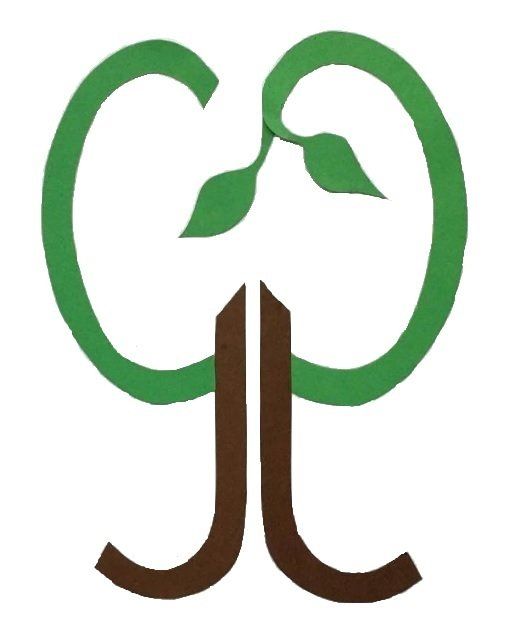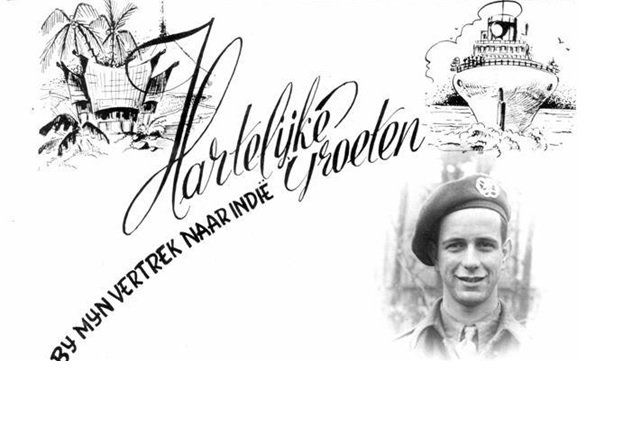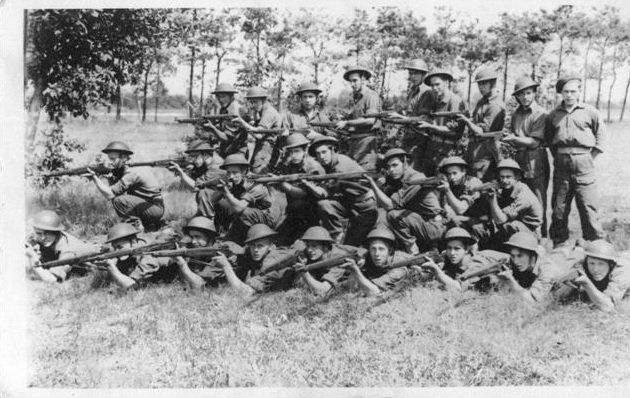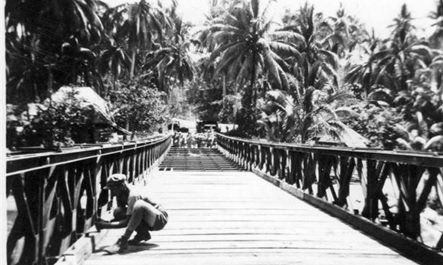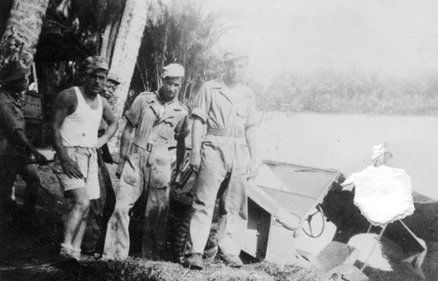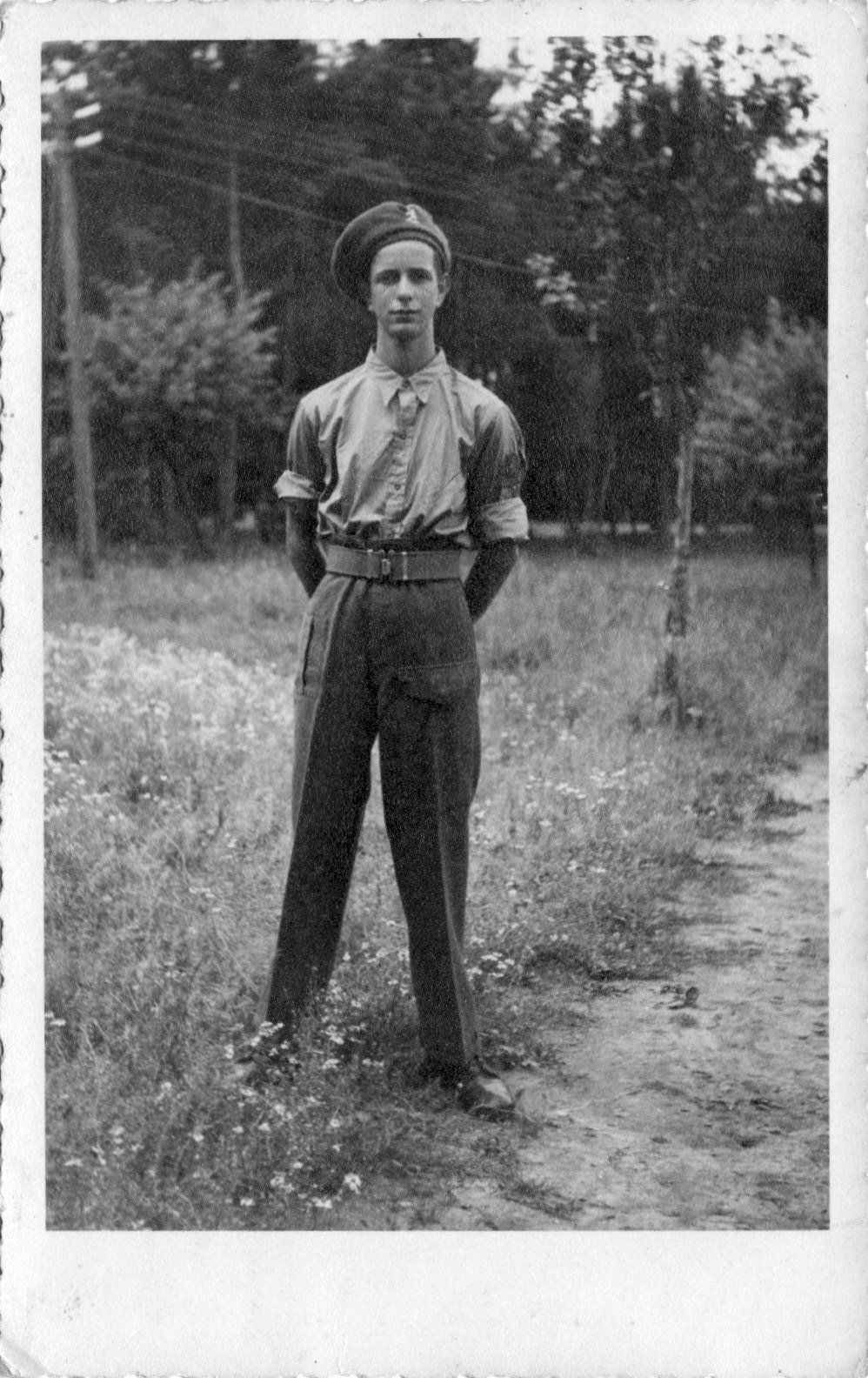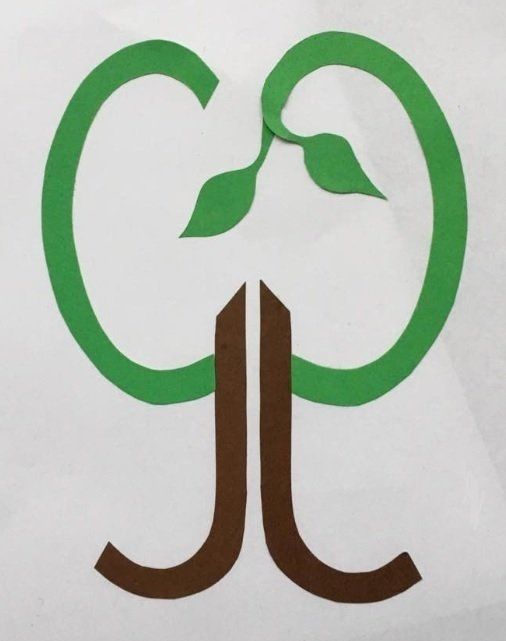Tinus to the Dutch East Indies
A story about the person. With respect to everyone who has been touched by this time. A journey that has been decisive for his 'being'. The boy from the village faces a strange world. This led to lifelong friendships.
1947 - 1950
Dutch East Indies
The journey
My father's photos are pasted in order in his photo album. This order and description allowed me to follow the route of his journey. Indonesia in itself does not appeal to me, although I think it would be fantastic to follow in his footsteps.
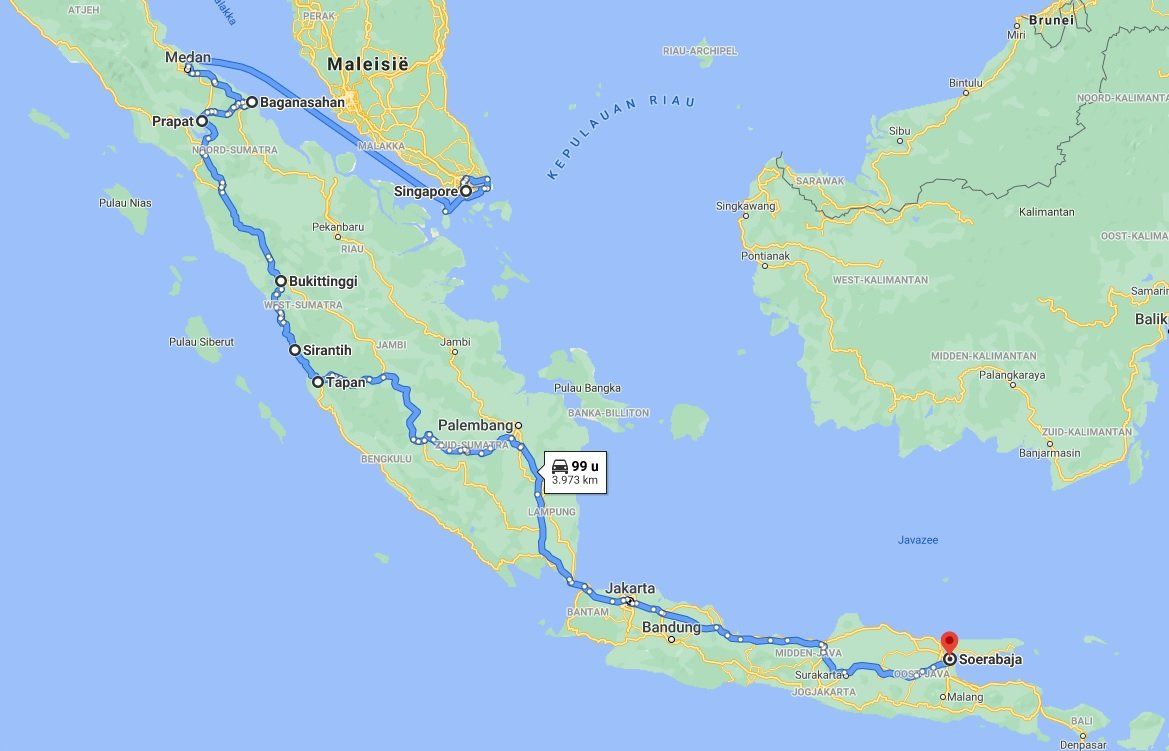
My father's story. I have gained enormous admiration for my father after hearing stories about his time in the Dutch East Indies. I "understand" him better. His "being", his "Band of brothers" feeling, his sadness at the loss of mother, brother and comrade at that time.
Straight from the village to an unknown situation
Tinus in militaire dienst.
When cleaning out my attic (2/26/2008), I found a large box full of papers from my parents. Reports, diplomas,
certificates, papers associated with the awarding of medals to my father, remembrance booklet of the Dutch East Indies
and a booklet in which my father wrote a small piece about his wartime. I can't suppress a feeling of excitement. His story is getting bigger and more complete. I am writing to the Ministry of Defense for more information.
April 10, 2008, the long-awaited letter from the Ministry of Defense arrives. There is a passport photo in the envelope, one that I have not seen yet.
A young man of 20 in service clothes. The photo was probably taken in civilian clothes on his first day, the day of registration. Furthermore, the statistical data of his journey.
My father is a conscript soldier from July 2, 1947 – July 9, 1950,
He is in the 14th Engineer Field Company, 1st Pioneer Regiment. Army number: 271010196 He leaves for Singapore on February 28 with the SS Volendam. Then with the Plancius to Belawan. On December 25, 1950, 2 days before the transfer of sovereignty takes place, Tinus is in Surabaya, East Java. He visited both Sumatra and Java. On May 4, 1950 he leaves for home with the General M. Stewart.
His work at the Genie. He is a driver/sitter. According to testimonials, he often participates in confidential conversations and appears to be able to remain silent. Further:
* clearing bombs and mines on convoy roads
* obtain Bailey material in stock by replacing Bailey bridges with fixed bridges (such as Genoeg Melajoe, Aek Taroem and Nama Oengas
* repair government buildings
* repair Bailey bridges
* construction of landing strips for Pipercups near Benoet
From testimonials from various military executives, from Tinus's application for the Police: Later, Tinus was given other positions, including driver and babysitter. He usually follows behind the actions and occasionally he leads the way. That the functions could differ at that time and was not known to everyone is evident from his file and his photos. These confirm the timeline and other locations.
The person Tinus
In his youth, Tinus did not go further than a few villages in the area of Paterswolde/Eelderwolde, Drenthe. It must have been quite something to start his “great adventure” in 1947.
Hij is een ondeugende jongeman. Geld bestemd voor het kerkzakje wordt regelmatig opgemaakt aan andere zaken. Maar iemand die geld of hem nodig heeft kan op hem rekenen. Dat is altijd zo gebleven.
Tinus is ook een stille man. Hij wist op jonge leeftijd al te zwijgen over zaken die niet naar buiten mochten komen, en dan heb ik het over de kwajongens streken.
His brother once told me that if Tinus said he would never tell, he indeed never did. Not even when the constable came to tell a story about a group of boys he belonged to.
Tinus went on a milk round for some extra pocket money. This means: picking up the milk cans (30 kilos each) and placing them on the cart beyond his control.
During the payment round, he can sometimes choose between a cent or a drink. The drinks are normally intended for the older ones who were doing the rounds. My father said that it was often said: "Give that boy a drink too."
During his time as a police officer in Amsterdam he had various “adventures”. Think of, among others, the riots during the squatters' period and the football riots. I've often seen him come home with bruises. He never wanted to take his gun with him. “If you have it with you, you might be more likely to use it,” he would say.
Tinus has a quick conversation. Often talks his way out of problems (including his own ;-) or used his talk to get something.
Even though he comes from Drenthe, he has become a true Amsterdammer. He loves the Dutch anthem, Johnny Cash and Spanish folk music. To the amusement of my family.....because I can often throw out an unknown tearjerker. After his retirement, Tinus works in an Amsterdam pub. There are also many stories to tell from this period. I am happy that, despite several exciting and also unpleasant adventures, I spent a lot of time with this quiet but colorful man.
Tinus in the army.
Tinus starts his training in the Kromhout barracks. On August 3 he is transferred to Camp Prinsenbos, near Gilze Rijen airport.
There he was assigned to the 14th Field Company, namely Pioniers. In September, Tinus will receive training at the mining school in the Cort Heyliger Barracks. In October, Tinus ends up in Fort Rhijnauwen near Bunnik.
During the training, the soldiers are shown an instructional film about what awaits them in the East. Also a book to learn Malay. They also receive a cocktail shot against all kinds of diseases.
I found a page in a book with "good advice" for the soldiers:
“Put a guard over your lips. Destroy letters, documents and notes that should not fall into foreign hands, be politely correct and not too confidential, remain constantly vigilant, snipers and hand grenades are in places where people do not expect them. Sometimes arrows dipped in poison are shot. Be careful when touching. Never lose sight of your firearm. Don't seek irresponsible and unnecessary adventure, you may never return. Realize that our allies are not there for pleasure either, but to help us.” Furthermore, warnings about the sexual act were given and a booklet was distributed.
De helm uit het 'wapen', welke symbool staat voor de 14de compagnie, heeft mijn vader als tattoo op zijn bovenarm laten zetten. Het zetten van de tattoo gebeurde gezamenlijk in Nederlands Indië. Er is behoorlijk gedronken. Er wordt wat geopperd en men handelt. De een is helderder dan de ander. Mijn vader was goed in het bedenken van mischief. De volgende ochtend worden
some comrades wake up with an unpleasant surprise ;-)
De zeereis.
On February 28, 1948, Tinus leaves for the Dutch East Indies by SS KPM Volendam. He arrived in Belawan (Medan) on March 26, 1948. There are approximately 2,800 soldiers on board. Officers have cabins with bunk beds, but the soldiers sleep in hammocks in the hold.
It stinks terribly. There are insufficient places to sleep and many sleep on the floor.
On board, Tinus has received his first punishment. He has to go help the cook. This does not appear to be a real punishment for Tinus because the cook regularly has to go ashore to replenish his supplies. Tinus is then allowed to come along. He often comes off board and immediately gains new impressions. Sometimes he accompanies the cook and sometimes he is given the opportunity to explore the neighborhood alone because the cook does not want him around when he goes to take care of his “own business”. .
The trip goes from: Rotterdam, Gibraltar, Algiers, Malta, Port Said, Suez Canal, Red Sea, Aden, along the coast of Africa, Guardafui, from the Maldives to Sabang in about 6 days.
At Port Saïd many boats, the so-called Parlevinkers, come along to offer their merchandise. On shore the game is what we now call “ball, ball”. There the magicians shout chicken, chicken.
In a few ports it is possible to receive and send mail.
On the way to the Red Sea the roll call was abolished. Too many soldiers are dying due to the heat. They have seen sharks near Aden and sperm whales off the African coast.
In Aden, many soldiers buy cigarettes. About 2 to 3000 pieces is normal.
The crew members buy carpets to take home.
Aan boord is er best wel vertier. Er worden bokswedstrijden georganiseerd, filmvoorstellingen met Laurel en Hardy, er zijn kerkdiensten en er is revue.
On this trip someone smuggled a little dog, Jackie. This also provides distraction.
Furthermore, we know from other stories and diaries that there are mandatory rest periods between 2:00 PM and 4:00 PM.
There is also morning exercise, usually around 6:00 am. Information is also provided about how you can protect yourself against the malaria mosquito.
The food is good. Potatoes with capuchins or princess beans and pudding.
Onderweg vindt ook een gezondheidsinspectie plaats. Er wordt gecontroleerd op scabiës, schaamluis en allerlei andere zaken. Op de terugtocht zou dit wekelijks plaatsvinden. Men moet ten slotte schoon thuis komen ;-).
When crossing the Equator, “Neptune” comes on board. Another break during the long journey.
Advice when disembarking: “Don't throw away cans because the enemy turns them into hand grenades.
Tinus in the Dutch East Indies
The 14th Engineer field company was founded on January 7, 1948. They are part of the E-Division Trident.
The symbol, the helmet, is tattooed on Tinus' arm. They are assigned to the Z brigade and the U brigade.
Locations: Fort de Kock, Fort de Kock, Poera Mountain, Bindjai, Fort de Kock
Commander: Capt. HA Franssen 07-01-1948 / 30-08-1948, Maj. Y. Best 30-08-1948 / and Kapt. M. Müller
Aangekomen in Medan, verblijven zij daar 2 maanden voor zij naar Padang vertrekken.
One man died. That must have made a huge impression as I found a lot of photos of it.
After contacting Jan Bleijenberg, it turned out to be the same person. Didn't die in battle but from Malaria. Gijsbertus de Wildt, born 07-01-1927 in Beesd, died 04-12-1949 in Padang. Died of Malaria in hospital in Padang
During the 2nd police action, on December 19, 1948, the 14th Engineer Veld Cie. takes part in the advance to Fort de Kock. On the first day the advance was very delayed on the route to Loeboek Soelasih. Part of the main force is forced to continue on foot. After the engineers have repaired the four bridges in the route and cleared the many barriers, the motorized column can also continue its advance.
In hoog tempo wordt de opmars voortgezet via Padangpandjang naar Fort de Kock dat op 22 december wordt bereikt.
In the following days, the 14th GnVeldCie was also frequently deployed in purification actions in the newly occupied area.
After the 2nd police action, a difficult time begins. The main task of 14 GnVeldCie is to keep the convoy roads open between the most important places.
Such as the Padang - Padangpandjang route, through the Anaï Gorge, where no fewer than six bridges are being built, or the Painan - Indrapoera route. Many other bridges have been built, for example at Pahnkambar, Koera Tadji and Moeara Sako. It often happened that a bridge that had just been repaired was destroyed again by the TNI that same night, after which the engineers could start again the next day.
After the cease fire in August 1949, the newly occupied territory was gradually handed over to the Republican troops. In December 1949 the entire 14 GnVeldCie was stationed in Padang again.
On April 7, 1950, 14 GnVeldCie was embarked on the "Johan van Oldebarneveldt" and transferred to Java where it was stationed in Buitenzorg until repatriation.
On February 28, 1948, Tinus leaves for the Dutch East Indies on the SS KPM “Volendam”.
On March 26, 1948 he arrived in Belawan (Medan, East Sumatra). He stayed there for 6 months.
September 30, 1948, Tinus boards the Plancius towards Batavia. They made a short stopover in Singapore. After arriving in Tandjong Priok (port of Batavia) they are stationed at Mr. Cornelis. From this port they will leave on October 9 with the “van Oudshoorn” to Padang in West Sumatra, where they will arrive on October 12.
In his position as a driver, he drove through the immense Sumatra in various trucks.
During the last months of his service, Tinus was stationed on the island of Java in Batavie (now Jakarta). The post: Meester Cornelis (now a district of Jakarta)
May 27, 1950 Tinus is back in the Netherlands.
For his time in the Indies he received the Order of Peace and 2 clasps. The medal and 1 buckle and the associated certificate are in my possession.
I have 300 photos of the affected areas. The timeline of history matches the order in which my father pasted them. I carefully pried them loose with a knife and scraped off the 2 layers of paper with the patience of an angel. The texts that Tinus has written on the back give me an idea of the grimness, emotion, camaraderie and his own view of things. A precious thing.
Tinus builds bridges as a soldier with the 14th Engineer Veldcie. Including Bailey bridges. A Bailey bridge is a panel bridge. With standard panels that are interconnected. Specially designed (by the British Donald Bailey) for the Engineers so that manpower can assemble them in all kinds of positions. A bridge can overlap about 60 meters and carry heavy vehicles. Many photos show this. They are used as a temporary bridge.
Later he becomes a driver and babysitter. Nanny is something like a Personal Assistant. Taking care of transportation and household concerns. He already taught us how to officially set a table.
From the personal comments of his superiors it can be seen that he was a modest, confidential man who often attended confidential conversations and knew how to keep his mouth shut.
I also remember the stories told by my father about his punishment in the Indies. Tinus is punished and has to sleep in a cage in the wilderness at night. The sounds from the jungle and having to be wary of the enemy create the necessary tension. He said that there are fireflies that make it look like a smoking person is walking towards you.
Latrines are being built. By digging a rectangle and laying 2 beams over it. You then sit with your backs against each other. There will be a wall of woven reed (atap) around it and a rusty piece of corrugated iron on top.
It must have been a completely unknown and surreal life. A Band of Brothers will certainly have arisen between the troops.
His best buddy and friend is Ko Stroo.
The fact that at the end of the war photos were exchanged with messages on the back such as: “In memory of your Japie” and “your M.” reflect the bond.
Ko has visited regularly. Years follow with reunions and contacts.
During the time in the Dutch East Indies, the soldiers were kept informed of the fallen soldiers through the magazine “de Koerier”. The list keeps growing.
Tinus eventually comes to the Netherlands in 1950. He spent the last 4 months on the island of Java in Batavia, Meester Cornelis, known as Berenlaan. He sails to the Netherlands on the General Stewart. The opportunity offered to him to emigrate to Australia is blocked by the home front. His eldest brother Jan advises his father to let Tinus come home first. That is a shame because when you emigrated from the Indies, the government transported you for free, with the option of coming back to the Netherlands for free if you did not like your stay within a year. This offer is no longer valid from the Netherlands. (This was told by Tinus himself and has yet to be confirmed by sources). Detail, brother Jan emigrated to Canada not long afterwards.
Searched and found answer > It appears that the Dutch Government subsidized the emigration of individuals for the first time in 1949.
My father told my husband a lot, including details.
My father said about his period in the Dutch East Indies: “Less pleasant things happened, but you tried not to think about them.” An understatement, but that's how my father was, he doesn't go into it too deeply.
I once asked him the “innocent” question at the age of nine: “Dad, have you ever shot someone”? For this I received the only blow from my father in my entire life.
Bij het solliciteren bij de Amsterdamse Politie in Amsterdam worden inlichtingen ingewonnen bij diverse mensen die Tinus kennen. Van Dominee tot zijn meester van de lagere school, van de gemeentesecretaris uit zijn dorp tot zijn leidinggevenden van Militaire dienst.
Below is a report from one of Tinus's managers during his time as a driver.
MJ Dek:
“Hij heeft getoond een zeer goed aanpassingsvermogen te hebben, zijn doorzettingsvermogen was eveneens onbegrensd. Onder “normale” omstandigheden maakt hij een ietwat “teruggetrokken indruk”, hetgeen niet in overeenstemming is met zijn karakter. Een goed en handig chauffeur, die elke lastige situatie bevredigend wist op te lossen. Hij is een zeer betrouwbaar persoon, die bij vele vertrouwelijke gesprekken aanwezig was en bij wie men, in zijn aanwezigheid, rustig alle bijzonderheden kon bespreken zonder dat er wat uitlekte”.
Bij terugkomst in Nederland kregen de militairen geld voor elke maand dat zij in Nederlands Indië zijn geweest. Mijn vader kreeg een behoorlijke som. Dit bedrag heeft hij bij thuiskomst in zeer korte tijd opgemaakt.
He had a “party”. We will make the necessary comments about that “party”. No one knows what goes on in their head at such a moment when they return home. Just as the soldiers left on their way to a great adventure, without having any idea what it entailed, so they will have returned. No idea how to continue in “normal” life. After all, this outside world had absolutely no idea what it must have been like and they did not always paint a positive picture of this time. I now only empathize with the humanity of these men. I have no judgement.
What has this sorting of photos, reading material on the Internet and hearing personal stories done to me?
I got an idea of the time in the Dutch East Indies. Understanding the feelings of the troops. And lastly and most importantly, I gained understanding for my father. I have heard stories that I will never write down. Stories that have helped me understand my father.
July 2, 1947
In the Royal Netherlands Army, in the 1st Pioneer Regiment, enlisted in person as a regular conscript of the class
1947
from the Municipality of Eelde under number 36
July 2, 1947
In maintenance with the 4th Company, 2nd battalion of the 1st Pioneer Regiment
17 sept. 1947
Seconded to the Mines School in Bergen op Zoom
26 sept. 1947
End of secondment
22 oct. 1947
Transferred to the 1st Company, 1st Battalion of the 1st Infantry Regiment
7 jan. 1748
Transfer to the 14th Engineer Field Company
28 feb. 1948
Left the Netherlands by SS Volendam
12 mrt 1948
Tropic crossed
26 mrt 1948
Arrived in the Dutch East Indies
1 apr. 1950
First class soldier
4 mei 1950
Uit Indonesië vertrokken per ms "Gen. M.B. Stewart"
May 16, 1950
Tropic crossed
27 mei 1950
Arrived in the Netherlands
July 1, 1950
Transferred to the 1st Regiment of Engineers (Pioniers) during reorganization
9 juli 1950
Long leave
May 28, 1953
Back
June 14, 1953
Long leave
July 1, 1955
Provisional exemption granted from attendance at actual service due to war, threat of war or other extraordinary circumstances.
15 sept.1958
Registered with the Genie
1 okt.1962
Dismissed due to termination of service
Decorations: Authorized to wear the Decoration of Honor for Order and Peace with the clasp 1948 and 1949.
http://www.trouwsslachtofferswestbetuwe.nl/dhr.-g.-de-wildt.html contributed to this site after the owner of the site requested information. It concerns fallen Dutch East Indies soldier Gijsbertus de Wildt. I found many photos of his funeral in my father's belongings.
In my possession: Booklet “Eelder boys in the Indies 1945 - 1950. Tinus also wrote a piece in it. That cost him a lot of headaches. Because what did he have to say? It has become a summary of facts. The personal part consisted of the sentence: “Still, it was a wonderful time, which I would not have liked to miss. Of course, there were also less nice things, but you prefer to forget that.
http://www.7decemberdivisie.nl/naamlijst/overleden-indie-veteranen
http://www.indiegangers.nl/index.php/digiboek en
http://www.oorlogsslachtofferswestbetuwe.nl/dhr.-g.-de-wildt.html
